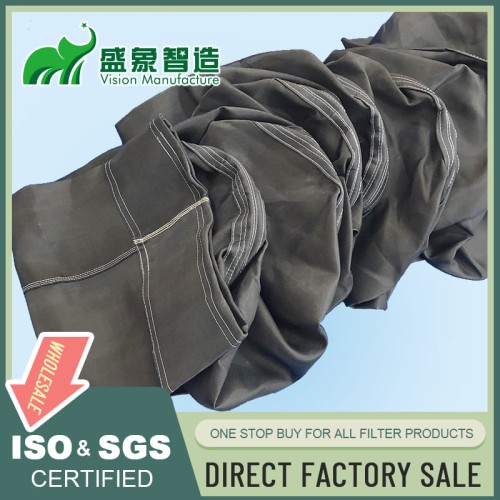
Fiberglass Bag Filters Excel in High-Temperature Applications
I. Introduction
High-temperature filtration poses significant challenges in industrial processes, necessitating materials that can withstand extreme conditions without compromising performance. Fiberglass, known for its robustness in high-temperature environments, plays a crucial role in meeting these demands, ensuring operational continuity and efficiency.
II. Properties of Fiberglass in Filtration
Fiberglass is favored in high-temperature filtration due to its exceptional properties:
- Heat Resistance Characteristics: Can operate continuously at temperatures up to 260°C and handle surges up to 280°C.
- Chemical Inertness: Exhibits excellent resistance to a wide range of chemicals, making it suitable for various industrial applications.
- Tensile Strength and Durability: Offers high breaking strength, ensuring durability under stress.
- Filtration Efficiency: Maintains effective particle capture even under demanding conditions.
III. High-Temperature Performance
Fiberglass filters are designed to perform optimally in high-temperature settings:
- Maximum Operating Temperatures: Capable of sustained performance at elevated temperatures without degradation.
- Thermal Stability Over Time: Maintains structural integrity and efficiency despite prolonged exposure to high temperatures.
- Comparison with Other High-Temp Materials: Often outperforms alternative materials in terms of thermal stability and efficiency.
- Impact on Filtration Efficiency: Ensures consistent particle removal efficiency, crucial for maintaining air quality and system performance.
IV. Industrial Uses
Fiberglass bag filters are essential in industries where high temperatures are prevalent:
- Cement and Lime Production: Captures particulates during the heating processes.
- Steel and Metal Processing: Filters out contaminants from high-temperature furnaces.
- Power Generation Plants: Used in coal-fired boilers to control emissions.
- Waste Incineration Facilities: Helps manage emissions and capture byproducts.
- Chemical and Petrochemical Industries: Ensures clean processes by filtering out pollutants.
- Glass Manufacturing: Critical for maintaining purity and quality in production.
V. Design and Construction
The design and construction of fiberglass bag filters are tailored to meet the demands of high-temperature applications:
- Fiber Composition and Treatment: Typically involves a blend of fiberglass and other synthetic materials to enhance performance.
- Weave Patterns and Densities: Optimized to provide the best balance between airflow and particle capture.
- Bag Shapes and Sizes: Available in various dimensions to accommodate different systems.
- Finishing Treatments: Often includes treatments like singeing, calendering, and heat setting to improve durability and performance.
VI. Operational Benefits
Using fiberglass filters in high-temperature environments offers several advantages:
- Extended Service Life in Extreme Conditions: Reduces the frequency of replacements.
- Consistent Performance at High Temperatures: Maintains filtration effectiveness throughout its service life.
- Reduced Maintenance Frequency: Durable materials decrease the need for frequent maintenance.
- Improved Emissions Control: Effective in capturing fine particulates, aiding in compliance with environmental regulations.
VII. Installation Considerations
Proper installation is crucial for maximizing the performance of fiberglass bag filters:
- Proper Handling Techniques: Ensures the integrity of the filters during setup.
- Cage and Venturi System Compatibility: Checks compatibility to prevent installation issues.
- Precoating Procedures: Sometimes necessary to enhance initial filtration efficiency.
- Break-in Period Management: Important for stabilizing the filter's performance after installation.
VIII. Maintenance Requirements
Maintaining fiberglass filters involves:
- Inspection Schedules and Methods: Regular checks to ensure optimal performance.
- Cleaning Techniques: Includes methods like pulse-jet, reverse air, and shaker systems.
- Replacement Indicators: Knowing when to replace filters to maintain system efficiency.
- Proper Disposal Practices: Ensures environmentally responsible handling of used filters.
IX. Safety Precautions
Handling and maintaining fiberglass filters require adherence to safety protocols:
- Handling and Installation Safety: Necessary to prevent physical injury.
- Respiratory Protection During Maintenance: Important to protect against inhaling fibers.
- Fire Safety Considerations: Fiberglass is non-flammable, but associated components may require fire safety measures.
- Disposal and Environmental Concerns: Proper disposal practices to minimize environmental impact.
X. Cost-Benefit Analysis
Evaluating the cost-effectiveness of fiberglass filters involves:
- Initial Investment vs. Long-Term Savings: Higher initial costs are often offset by longevity and reduced maintenance.
- Energy Efficiency Improvements: Lower pressure drops can lead to energy savings.
- Reduced Downtime and Replacement Frequency: Contributes to overall cost savings.
- Compliance Cost Reduction: Helps meet emission standards, potentially reducing regulatory costs.
XI. Case Studies
Examples of fiberglass bag filters in action demonstrate their effectiveness in various high-temperature settings, highlighting specific challenges they address and the benefits realized.
XII. Technological Advancements
Emerging technologies in fiberglass filtration include:
- Nanofiber-Enhanced Fiberglass: Incorporating nanotechnology to improve filtration precision.
- Hybrid Materials for Improved Performance: Combining fiberglass with other materials to enhance properties.
- Smart Monitoring Systems Integration: Enabling real-time performance tracking and maintenance alerts.
- Sustainable Practices in Fiberglass Production: Developing more environmentally friendly manufacturing processes.
XIII. Regulatory Compliance
Fiberglass bag filters help facilities meet stringent emission and workplace safety standards, ensuring compliance across various industries.
XIV. Conclusion
Fiberglass bag filters are indispensable in high-temperature industrial applications, offering unmatched performance and reliability. As filtration technology evolves, these filters continue to play a crucial role in meeting both operational demands and environmental standards, making them a wise choice for industries looking to optimize their processes.
Leave a comment

